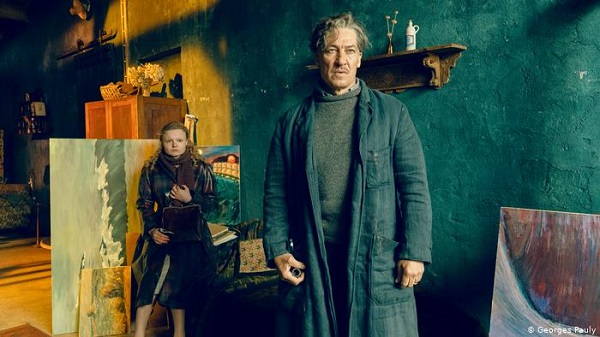The German Lesson (Deutschstunde) is a harrowing film about repression under an authoritarian regime. It is the first film adaptation of the acclaimed 1968 novel that German writer Siegfried Lenz wrote. Although yes, there’s also an acclaimed television movie in Germany that was released in 1971. Director Christian Schowchow adapted the screenplay that his award-winning screenwriter mother Heide wrote.
The story centers around Siggi Jepsen (Tom Gronau). He’s an inmate at a juvenile detention center in post World War II Germany. The cneter gives Siggi the task to write an essay on “The Joy of Duty”. And as Siggi beings to write, the film transports its viewers into Siggi’s youth. It also takes us to a small Northern town in early 1940’s Nazi Germany. It introduces us to a younger Siggi (Levi Eisenblatter) and his gloomy surroundings. Christian Schowchow’s direction sets the tone and truly makes you feel part of the bleak and isolating town.
In this small town, Siggi’s overbearing father, Jens Ole Jepsen (Ulrich Noethen) is a police officer. He has an extreme dedication to his duty. And in doing so, he leaves very little space for anyone in his life. This includes Siggi’s father’s best childhood friend, the charming Max Nansen (Tobias Moretti), a gifted expressionist painter. The Nazi’s banned Max from any working opportunities because of the Nazi’s ban on expressionism. Because they view expressionist paintings as “degenerate art”.
Siggi’s father is ordered to spy on and confiscate Max’s art. He also unfairly uses Siggi as an informer to spy on Max. Siggi finds himself stuck in the middle between his father and Max’s opposing views. And he attempts to navigate through the repression of his own freedom of self-expression. This oppositional rift also causes many painful reverberations throughout the small town. Along the way, it destroys relationships all in the name of duty.
Eisenblater leads a strong ensemble cast along with Siggi’s father Jens, (Noethen) and Max (Moretti). The three bring these relational conflicts to life in an emotionally engaging fashion. There are also Siggi’s mother, Gudrun Jepsen (Sonja Richter), Siggi’s sister, Hilke (Maria Dragus), and brother Klaus (Louis Hofmann). All deliver in showcasing dysfunctional family dynamics. Ditte Nansen (Johanna Wokalek), also brings nuanced depth as Max’s wife.
Visually we also see the stark contrast between the harsh, dark tones of the town, and the bright vibrancy of the paintings. That effectively showcases the contrasting world views between authoritarian and artist. Schwochow intentionally takes any warmth out of The German Lesson. And the film feels like it is in a constant state of chaos and dysfunction throughout its overlong runtime. At the midpoint, it started to drag on with the same repetitive story beats, particularly with tiresome character confrontations. There are certainly some editing and pacing issues. A more clear and concise edit could have provided even more emotional impact and resonance for viewers.
The story offers an intriguing look at topics that our current world is still examining; the importance of art, its value in our society and the integral creative relationship between art and artist. The German Lesson succeeds, not perfectly, in its harsh depiction of a repressive authoritarian setting. It does better through the strength of its winning performances and visuals.


